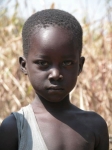28 January 2006
African Women Raped So They Will 'Have Arab Blood'...
 KHARTOUM, Sudan (AP) -- Killings, rapes and indiscriminate attacks driving tens of thousands of people from their homes continue in Darfur with perpetrators including soldiers who fired at civilians from helicopter gunships, the United Nations reported on Friday.
KHARTOUM, Sudan (AP) -- Killings, rapes and indiscriminate attacks driving tens of thousands of people from their homes continue in Darfur with perpetrators including soldiers who fired at civilians from helicopter gunships, the United Nations reported on Friday.
A 42-page report from the Geneva office of the High Commissioner for Human Rights chastised the government of Islamist-minded coup leader Omar el-Bashir, saying promises to end centuries of discrimination and marginalization of black African minorities were marked by "token gestures" while murder and torture go unpunished.
There has been growing pressure for stronger sanctions to be imposed by the U.N. Security Council, to be chaired beginning in February by the United States, which accuses Sudan's government of genocide.
The report details numerous cases of rape of African women -- some told "so you will have Arab blood," others because they were "slaves" -- and said victims who tried to get justice were instead abused.
One was beaten by three army officers, others were told they were lying and, in one case, a state doctor said rape was impossible because the woman was not a virgin.
There appeared to be "a lack of political will" to end impunity that encouraged attackers.
The report implied the government was blocking aid, saying aid workers have been ambushed and looted and recommending the government "permit and facilitate" humanitarian and development assistance.
"The human rights situation for Darfurians was made worse by the failure of the government to prevent and protect the internally displaced and villagers from being killed, assaulted, and raped by armed militias," the report says.
Instead, "in some of the attacks there was a clear government involvement," with troops fighting alongside militiamen or targeting civilians in alleged response to attacks by rebels, the report says.
That would contradict the government's repeated denials that it arms and supports Arab militias called Janjaweed that have unleashed terror in response to a rebellion started three years ago.
In what the U.N. has described as the world's worst ongoing humanitarian crisis, some 180,000 people have died, many from hunger and disease, and 2 million have been displaced in what British legislators on Thursday called a successful campaign of "ethnic cleansing."
Government blames tribal rivalries
Government officials -- who could not be reached for comment on Friday, Islam's holy day -- have tried to characterize the conflict as one marked by intertribal rivalries and centuries-old hostilities over limited water and pasture between sedentary black farmers and seminomadic Arabs.
In September, government troops "appeared to have engaged in coordinated attacks with armed militia" in South and North Darfur provinces that led to 39 confirmed deaths and forced between 7,000 and 10,000 people to flee, according to the report. Witnesses said the militia were on camels and horseback while the soldiers were in all-terrain vehicles commonly used by the military.
In November, witnesses said soldiers participated in attacks in South Darfur in which 20 civilians were killed and up to 20,000 people forced from their homes.
The report describes a November 18 attack in West Darfur: "The government stated that the attack was aimed at Chadian rebels ... Approximately 50 soldiers jumped from the vehicles and ran behind them (civilians), shooting indiscriminately in and around the village. Gunfire was also fired indiscriminately from the helicopters."
The report makes numerous recommendations, including that Sudan's government address root problems of discrimination and unfair allocation of resources that have sparked ongoing conflicts in west and east Sudan and that led to a 21-year civil war in the south, ended by a January 2005 peace agreement that has been only partially implemented.
POST IT BY CNN.COM
06:50 Posted in Africa | Permalink | Comments (0) | ![]() Facebook |
Facebook |



















The comments are closed.